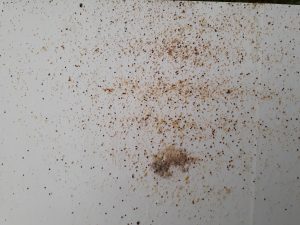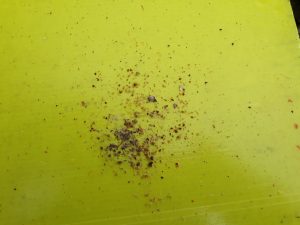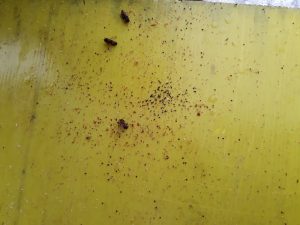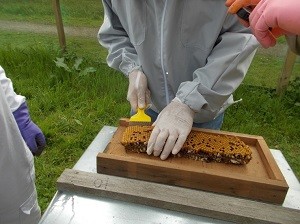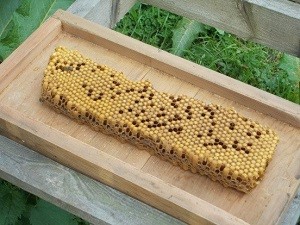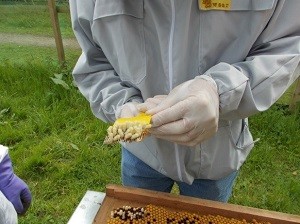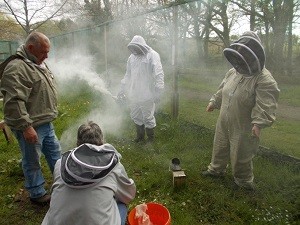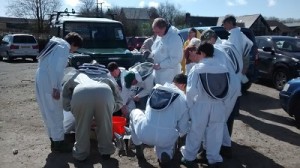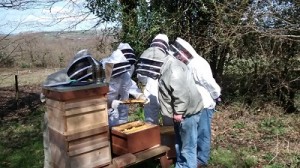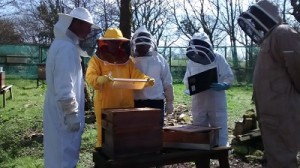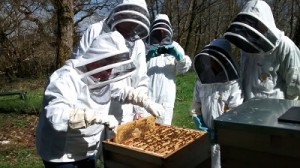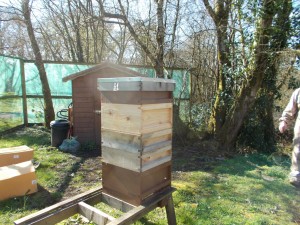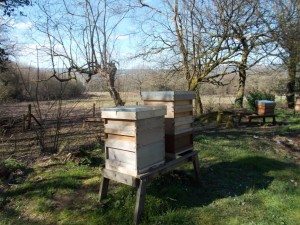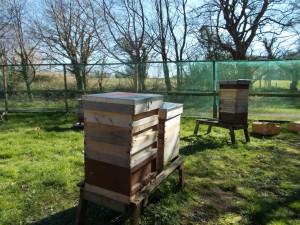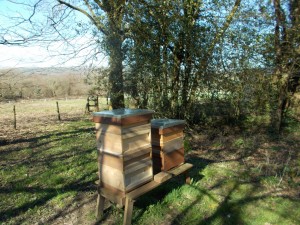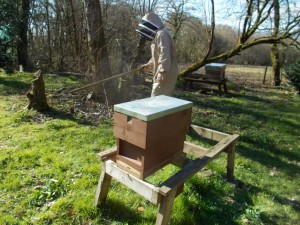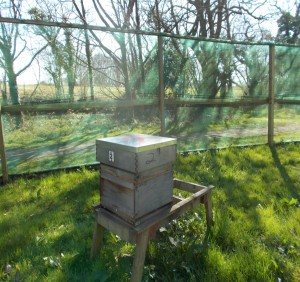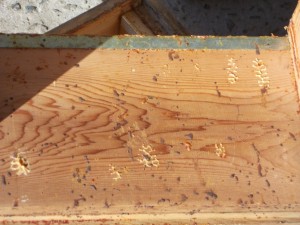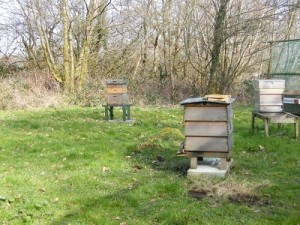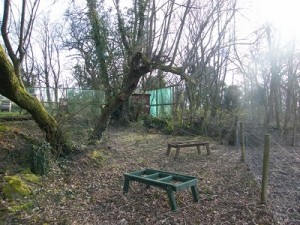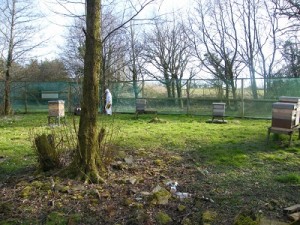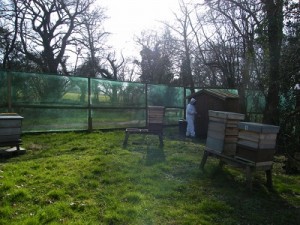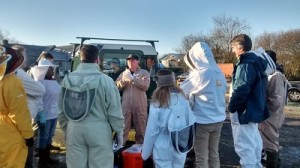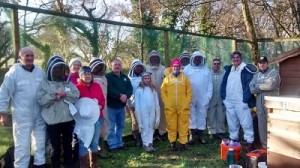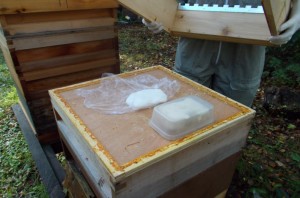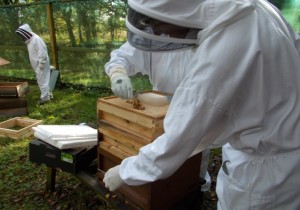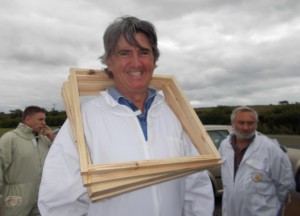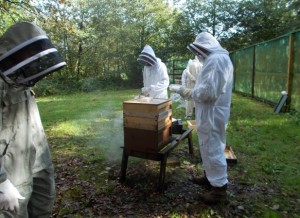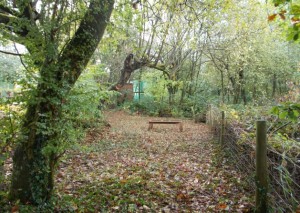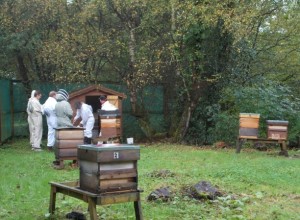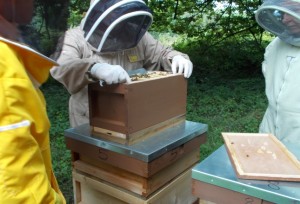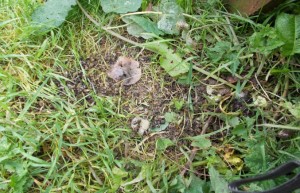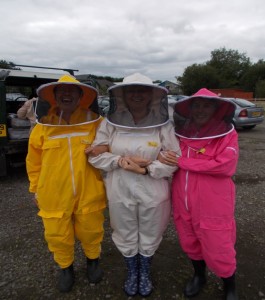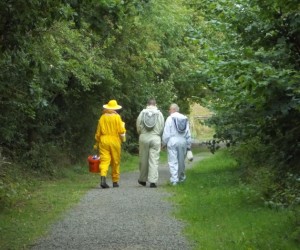Apiary Update 2025
The apiary is open for all new members to gain experience in the management of an apiary, learning transferable skills for when they have their own colonies to look after.
Sessions start at 10am each Sunday (see calendar for exceptions). Meet in the car park at Llys Nini Animal Centre, Penllergaer, SA4 9GX. MAP
Any queries to the Apiary Manager Martin Davies at sdbks.secretary@gmail.com
Apiary Update September 2024
Apologies for the gap in updating this page. Various things like life and work often get in the way!
We currently have 12 colonies at the site and they have all been boosted with a feed on Invertbee, following the very poor summer, or lack of. We will continue to monitor all colonies over the winter and feed them as necessary to help them make it though the winter.
Roll on spring!
Apiary Update December 2022
Currently 8 hives settled down for the winter. The mild weather has meant that all colonies have still been active and may have depleted their stores so additional fondant added a little earlier than usual.
Sheds tidied up and sorted so all set to resume normal apiary activities in the spring.
Apiary Update August 2022
The apiary move has been completed and the colonies are all settled down in their new location. It is late in the season but it is expected that we will open the apiary to the beginners from August 12th, once we have the shows out of the way.
We are still looking for an Apiary Manager, if you are interested in taking this important position please contact us to discuss further.
Apiary Update January 2022
Well the pandemic has had a big impact on our society apiary activities. Restrictions meant that it was only open for brief periods over the last 2 years and even then we had restrictions on the numbers allowed.
The big update for 2022 is that we are now relocating the apiary within the grounds of Llys Nini. The morning of February 6th will see “all hands on deck” to move the hives around 400 metres to a new site south east of the existing location. The new site provides easier access and, more importantly, is away from the public areas of the animal sanctuary. Site clearance has already begun and the hives will move first, then we have to figure out how to move the 2 storage sheds!
Apiary up-date Sunday 12th January 2020
So today we did a mite drop check on the colonies. The drop ranged from around 50-100 in one colony to around 500-600 on the worst, with the remainder all being around 200-300 mites present on the boards. It doesn’t appear than any particular technique was better/worse than another, as they all worked, though the gas powered vaporiser was significantly quicker than the other 2 methods used. Photos below:
Apiary up-date Sunday 5th January 2020
It’s been a while since an update was posted! Today we carried out the varroa treatment on the Society Apiary Hives. Most were treated with the conventional car-battery powered vaporizer, a few with the gas vaporizer (Thanks Ade) and a few had the dribble method done on them. Will be interesting to see if there are any differences between the mite drop for the different techniques. Floors were put into the hives and will be checked next week.
Many thanks to those hardy members that attended the session. We almost stayed dry!
Apiary up-date Saturday 9th May 2015
HI every one there was another good turnout at the apiary today. A mixed bag of beginners and more experienced beekeepers. The colonies were inspected and a nuc was made up and positioned on a quiet stand, fed and left for them to get on with it. A colony was placed from a nuc into a full size colony. The large two and a half brood was split for the show, with a strong colony left to raise a new queen. The basic assessment session went well and your all looking good.
Apiary up-date Monday 4th May 2015
There was quite a few members 15 or so. The basic assessment {BA) candidates all done well and led all of this years intake and reports came back favorably. There were a few tasks done at the apiary today, An Apidea was made up with a queen which has stopped laying, this was replaced with a queen cell. A colony that was planning to swarm had all queen cells removed and a nuc colony was made up. A Q and A session was done around the nuc colony. I hope all had a good time, see you next time.
Apiary up-date Saturday 2nd May 2015
The apiary was closed on Saturday due to the cold winds but will be opened Monday instead for colony inspections. This session was replaced with a hive construction and stand making day, many thanks to Mike, Jo and Gerti for all the cakes. Felt stuffed after the cakes.
Apiary up-date Saturday 25th April 2015 Hi all the apiary was opened to all members, for those who attended there was a chance to go through the colonies. The members that are doing their basic assessment did a trial inspection and all went well. A demo of drone uncapping was done with a brief talk on why and how to do it. A good time had by all.
Apiary up-date Saturday 11th April 2015 HI all. The beginners class of 2015 were at the apiary under the watchful of Mike, Ian, Stephen and our beloved chair person Nicola. A demo was done in the car park on the lighting of smokers which went well. The weather was a bit breezy in the car park but it was quite sheltered inside the apiary. The 11 strong team went down to the apiary site all suited up and descended on the unsuspecting bees. The class was split up into groups and with a team leader they went through at least 2 colonies of bees per group, each member handling the bees in-turn.During the manipulations queens were found and marked, hives strengthened from prolific colonies and measures in place to reduce the swarming instinct. The groups had many questions which i hope were answered satisfactorily. All the record cards were filled in by the groups. The apiary was closed and the bees left to do what they do best. The temperament of the bees were good and to my knowledge none of the class were stung, except Mike, which was his own fault.
Apiary update Monday 6th April 2015
There are 5 awesome colonies at the apiary, they were supered up, some with more 15 frames of bees and 7 frames of brood. There is 1 colony that is a drone layer and 1 which has had a bad case of dysentery. That has been placed into a nuc box and the frames destroyed and the boxes sterilized. The apiary site is now ready for the beginners class to attend hope fully next Saturday if the weather continues. As you can see from the photos some of the colonies have brood boxes above the queen excluder, ready for the many nurse worker bees to draw out.
Quite a large colony already building up for queen rearing
Some hives are romping away
The colony has been placed into a nuc This is the drone laying colony
The bad case of dysentery on one of the hives
Apiary updates Sunday 22nd March 2015
The new Langstroth hive in place and WBC back with new look slabs under hives.A really quick look at the bees, they seemed ok. There are a few weak colony`s and a couple of really strong ones. Have made a few new hive stands and the apiary has a newish layout. The weather is improving and hopefully the apiary will be opened for spring inspections. I will keep you all informed. Took some photos today for you all to enjoy.
Oxalic Acid Demonstration at the Apiary site
On Sunday 28th December the weather was cold and dry, and hopefully the colonies were broodless for an Oxalic acid demo. The e-mail was sent out and 16 or so new and experienced beekeepers braved the Sunday morning to see the demonstration.
It all started in the car park with a shortish talk about oxalic acid (OA). It is used to kill varroa mites as part of an integrated pest management (IPM). The OA is used in a liquid form which is 3.2% in strength and is already diluted in sugar syrup. 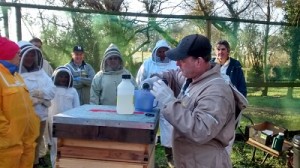 A jar of OA is placed into a hot bath of water, so it is warmed up, this helps the bees as it`s not too much of a shock when it`s squirted on top of them. The treatment is administered with a syringe on to the bees. It helps to practice with water in the syringe before using the OA, as it`s quite difficult to get the right pressure on the syringe the first few times.
A jar of OA is placed into a hot bath of water, so it is warmed up, this helps the bees as it`s not too much of a shock when it`s squirted on top of them. The treatment is administered with a syringe on to the bees. It helps to practice with water in the syringe before using the OA, as it`s quite difficult to get the right pressure on the syringe the first few times.
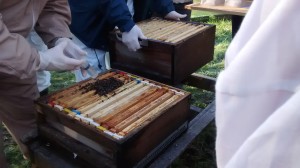 The syringe should hold 50ml of OA, a maximum to be given to a colony, if there is a small cluster of bees then administer less. A guide line is 5ml of OA per full seam of bees. If the bees are on a brood and half, and the bees cannot be seen then split the half and administered the OA onto the bees below, although this might cause the bees to break the cluster and fly. During this time of year all mites are surviving on the bees with little or no brood for them to breed in. The OA will attack these mites destroying them before having the opportunity to increase their numbers to dangerous levels, the only down side is that it destroys brood at all stages and upsets the winter cluster of bees hence why we treat at this time of year.
The syringe should hold 50ml of OA, a maximum to be given to a colony, if there is a small cluster of bees then administer less. A guide line is 5ml of OA per full seam of bees. If the bees are on a brood and half, and the bees cannot be seen then split the half and administered the OA onto the bees below, although this might cause the bees to break the cluster and fly. During this time of year all mites are surviving on the bees with little or no brood for them to breed in. The OA will attack these mites destroying them before having the opportunity to increase their numbers to dangerous levels, the only down side is that it destroys brood at all stages and upsets the winter cluster of bees hence why we treat at this time of year.
The beekeepers headed to the apiary armed with syringes and OA. The duty Apiary manager demonstrated on the first hive and then they teamed up and descended on to the unsuspected bees. The groups of three worked as a team and within minutes the 8 colonies of bees were treated without too much disruption. The colonies were all well, stores were checked and where low fondant was added.
The swarm of beekeepers left confident to treat their own bees.
Happy beekeeping from the apiary team….. see you all in the new year.
Apiary meeting on Saturday 11th October 2014
Hi everyone the meeting went well despite the heavy showers predicted. The session consisted of placing fondant on the hives to help the colony with extra stores if needed. The fondant was placed on the crown board on top of the vent holes. This does two things, it blocks up the holes to prevent a draught going through the hive as we now use open mesh floors, and it allows the bees to access the fondant over a few frames. As can be seen from the picture we put one in clingfilm and one in a takeaway container.
This was done to all the hives in the apiary by the members and then mouse guards were fitted to prevent unwelcome lodgers over winter. The hives are almost shut down for the winter now all that remains is to secure the tops of the hives to prevent them toppling over and roofs blowing off.
As the apiary page is up and running I hope to keep you all informed of what is going on
The apiary site is looking good now through the work of the members and the new area that has been cleared is ready for queen rearing next year.
During the beekeeping year we have had some highs and lows. The success of nuc colonies and the loss of colonies who`s queens did not return from mating and ended up being shaken out of the hive to take their chances.
There have been some good characters that have kept the mood light and amusing during apiary sessions I am sure you all know who they are. There was also a fashion show at the apiary site with members sporting colourful suits.
The apiary team would like to wish the class of 2014 the very best for their future in beekeeping and not to forget to still come to the apiary meetings next year, I am sure we can get you to mentor some of the “freshers” of the class of 2015.
The apiary site is now closed until the oxalic acid demo during the break between Christmas and New Year, this will be advertised at a later date.
Cheers
Stephen Davies (SDBKS apiary manager).
Saturday 11th October 2014
Join us at the society apiary this Saturday when we will be checking the stores on the hive and putting a winter feed of fondant onto each hive. We will also be looking at the storage of frames and equipment over winter, and discussing the use Acetic acid for sterilising frames, a demonstration will follow at a later date.

